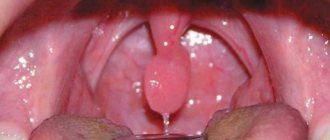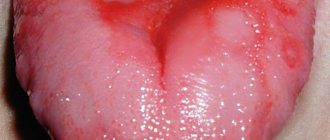The uvula is an important component of the human body. This organ is located in the larynx. It is easy to notice - it is a small process, shaped like a pear. It is responsible for performing the barrier function, which includes protecting the respiratory tract from food entering it by redistributing air and food flows.
However, a serious pathology may be associated with this small organ - its adherence to the tonsil. This phenomenon is accompanied by unpleasant symptoms and, in some cases, can only be cured with surgery.
Principle of operation
Human anatomy in the first stages of its formation forced scientists to ask the question: why does a person need this appendage?
Some believed that it was an underdeveloped second language that we inherited from reptiles. Others, on the contrary, were inclined to think that its presence was useless, and in some cases it even interfered. One way or another, with the evolution of medicine, the importance of this pyriform process has been scientifically proven.
The principle of its operation explains all its importance: when food enters the oral cavity and moves further, a spasm of the throat occurs, during which the mechanism of the hyoid muscle is triggered, closing the trachea from food entering them.
In addition, the tongue also takes part in the reverse process. That is, when the regurgitation process occurs, he completely controls it, not allowing food to rise into the oral cavity.
Symptoms of inflammation of the uvula
With uvulitis, the uvula first turns red, then gradually swells and swells.
The disease develops rapidly. In most cases, uvulitis is characterized by a sharp and sudden onset. The pathology is accompanied by the following symptoms:
- sensation of a foreign object in the throat;
- gagging;
- difficulty swallowing movements;
- pain when swallowing food and saliva;
- difficulty speaking;
- respiratory dysfunction;
- excessive salivation.
Symptoms become more pronounced when a person eats, coughs, or sneezes.
If you experience the symptoms described above, you should immediately go to the doctor. People who have their tonsils removed are most susceptible to uvulitis.
The disease is especially severe in young children. If a child's tongue is swollen, you should immediately call an ambulance.
Functions
The tongue performs such important functions as:
- Separation and redistribution of air and food flow.
- Preventing foreign objects from entering the respiratory tract, causing a spasm of the throat, narrowing its lumen.
- Participates in the formation of the gag reflex and cough.
- It divides the pharynx conditionally into two symmetrical parts; by its presence, one can determine the anatomical state of the tonsils and compare their sizes.
- Actively participates in heating air masses during mouth breathing.
- Helps to give tone to the voice by regulating air flows and their strength.
The many functions of this important organ suggest that it is necessary in the human body.
Causes of enlarged uvula
A healthy tongue is so small that it is not felt at all.
You can see it only by opening your mouth wide in front of the mirror. The Latin name for the small organ is uvula, which is why the disease is called uvulitis.
The enlargement of the palatine process is caused primarily by an inflammatory reaction.
Less commonly, the organ swells due to allergies, trauma, temperature exposure, irritation with chemicals, tumor development and some other negative factors.
Inflammatory pathologies
Not all diseases of the respiratory system are accompanied by an enlargement of the uvula. Typically, the palatine process swells during an intense inflammatory reaction, involving large areas of tissue in the throat and oral cavity.
This pathological phenomenon is observed either with high activity and toxicity of pathogenic microorganisms that provoked the disease, or with a weakened immune system.
Swelling of the uvula is diagnosed in the following inflammatory pathologies:
- acute and chronic tonsillitis;
- rhinitis;
- pharyngitis;
- adenoiditis;
- paratonsillitis;
- retropharyngeal abscess;
- dental infections;
- stomatitis, gingivitis and other inflammatory processes of the oral cavity;
- diphtheria;
- mononucleosis;
- inflammation of the salivary glands;
- tuberculosis, syphilis, immunodeficiency virus and other internal infections.
In what cases does pathology occur?
The tongue, like any other organ, may have pathologies in the process of its formation and functioning. There are several types of the most common pathologies that limit the full functioning of the organ.
Inflammatory process
As a result of microbes, mainly staphylococci and streptococci, getting on the surface of the tonsils, there is a possibility of inflammation on the surface of the uvula. This is mainly observed in advanced stages of the development of the disease, when the inflammatory process takes on an extensive form, penetrating and completely affecting the blood.
A long-term lack of proper treatment leads to the fact that the uvula becomes covered with ulcers and trophic lesions, completely disrupting the blood supply to the organ. In this case, its work is reduced to a minimum, limiting the throat capacity and also causing pain.
Sticking to the tonsils
Situations often occur in which the tongue sticks to the tonsil.
The reason for this may be either an inflammatory process (mainly of a chronic type) or a congenital pathology.
Temporary partial adhesion does not cause much discomfort, limited to the sensation of a lump in the throat and pain when swallowing. In this case, appropriate treatment is prescribed, which includes inhalations, rinsing and irrigation of the mucous membrane.
Adhesion may be temporary but may involve complete fusion of soft tissue. This pathology is quite dangerous, since with a strong cough it can provoke bleeding. The problem can only be solved surgically, so if you discover such a symptom, you should definitely consult a doctor.
No tongue
This diagnosis is congenital and is very rare. It is quite difficult for such people to control the eating process.
Quite often, food particles can enter the nasopharynx, causing significant discomfort. But, there are many ways to eliminate this defect, and get used to living fully in such conditions, following only the doctor’s recommendations regarding the pathology.
Treatment of tongue sticking to the tonsils
The medicine effectively helps with throat ailments
Before starting treatment, it is necessary to undergo examinations and determine why the tongue in the throat sticks to the tonsils and what causes the pathology. For inflammatory diseases, complex drug therapy is prescribed.
Treatment largely follows the treatment regimen for acute tonsillitis - antibiotics, antiseptics and immunostimulants are prescribed.
Antibacterial therapy is indicated only if the pathology is caused by a bacterial infection. A throat swab may be required to confirm the diagnosis. Medicines in this group are prescribed by a doctor; broad-spectrum antibiotics are often used.
If the body temperature rises, it means that the tongue in the throat has not only enlarged, but also become inflamed, and touches and sticks to the tonsil due to increased mucus production. In this case, symptomatic therapy is used to reduce body temperature and antiseptic gargling to reduce the infectious process.
At home, it is recommended to use Furacilin solution for rinsing, since this drug belongs to the group of antibiotics. To prepare the solution, grind one tablet of the medicine into powder and dissolve in a glass of water. Additionally, lozenges for sore throat and sprays with an antiseptic effect are used - these drugs can stop the progression of the disease and improve overall well-being.
Surgical method
If the cause of the sticking of the uvula in the throat to the tonsils is congenital pathologies of the larynx, hypertrophy of the uvula or tissue fusion, surgical treatment is practiced.
The enlarged tissue of the uvula must be resected, otherwise the organ will constantly touch the tonsil, causing a feeling of discomfort.
When the tissues grow together, they are excised, and the tongue is also trimmed to prevent the re-development of the pathology.
Folk remedies
Traditional medicine can only help if the sticking of the tongue to the tonsil is associated with an inflammatory process. In this case, antiseptic gargling with solutions of soda, salt, iodine, and propolis tincture is recommended.
To prepare a soda or salt rinse, dissolve 1 tsp in a glass of warm water. chosen remedy. It is better to give preference to sea or iodized salt.
To prepare an iodine solution, you need to dissolve 3-4 drops of iodine in 200 ml of water. This remedy is used with caution in children; in no case should the recommended dosage be exceeded, otherwise there is a high risk of burning the mucous membrane.
Rinse with propolis tincture is prepared at the rate of 1 tbsp. medications per glass of water. The finished tincture can be purchased at any pharmacy at an affordable price.
It is necessary to gargle every 3-4 hours.
Why can the tongue stick to the tonsil?
In fact, there can be a lot of reasons for this process: from anatomy to complex inflammatory processes. So, let's consider each of them, as well as the opportunity to avoid negative consequences.
Inflammation
The inflammatory process that occurs naturally on the tonsils, as a result of the virus entering the blood, makes the tonsils loose.
The amount of mucus produced increases several times. As a result of this, there is a possibility of the tongue sticking to the tonsil, which is eliminated on its own once the person has fully recovered.
Increased tongue size
There are cases when the tongue has an elongated shape, which makes it possible for it to constantly hit the tonsils in any order. When coughing or sharp sneezing, the tongue is able to independently change its location, relying not only on the outer walls of the tonsils, but also “falling” into the larynx.
This pathology causes a lot of discomfort, which can only be removed by surgery.
What symptoms are found in this pathology?
According to doctors, the first thing that should cause concern is a greatly enlarged tonsil, which, due to its size, can even partially block the pharynx. The palatine process adheres or grows between the tonsils, on which inflamed veins can be seen. With this pathology, the throat itself turns red, and the voice becomes hoarse. There is pain when swallowing food and a sore throat. In addition, the patient begins to cough, especially in the morning.
There are cases when doctors also noted an elevated temperature in sick people.
We recommend reading the article Food gets stuck in the tonsils
Drug therapy for uvulitis
If you can see that the tongue in your throat has increased, then you should immediately go to the doctor.
The medical specialist will prescribe the optimal treatment after determining the cause of the pathological phenomenon. In most cases, drug therapy for uvulitis is carried out.
The patient is prescribed both antibiotics and some other medications.
Medicines are prescribed only by a medical specialist . The doctor knows which medications will effectively cope with the pathology without causing harm to the body. Some patients do not consult a doctor, but only spray their sore throat with antiseptic sprays chosen at their own discretion. You can't do that. If treated incorrectly, uvulitis can cause serious complications.
In case of an allergic reaction, therapeutic measures are taken to relieve inflammation of the throat and relieve swelling of the palatal area.
Antihistamines are prescribed to help relieve allergy symptoms.
Also, if necessary, the doctor can prescribe glucocorticoids and diuretics.
If the soft palate is inflamed due to damage to the mucous membrane, then simple treatment procedures are prescribed. To restore the mucous membranes, it is enough to maintain oral hygiene and properly care for your teeth and gums. Swelling of the uvula associated with injury usually goes away after 1 to 3 days.
If uvulitis is a consequence of damage to the body by a viral or bacterial infection, then the use of antiviral or antibiotic medications is required.










